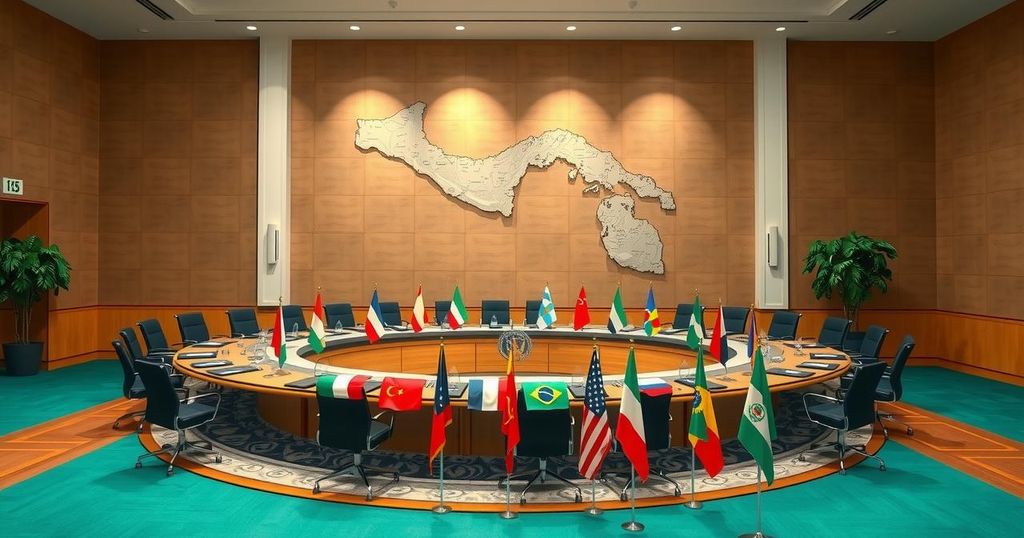A recent event at the Illini Country Club featured former Ambassador Edward O’Donnell discussing Panama’s geopolitical tensions and the implications of proposed tariffs. Attendees raised questions on the efficacy of transactional diplomacy and potential impacts on U.S.-Latin America relations. O’Donnell underscored the cultural significance of the Panama Canal and lauded President Carter’s human rights efforts during his administration.
On February 26, a sold-out audience gathered at the Illini Country Club to discuss current complexities in Panama and the implications of tariffs. More than 100 attendees enjoyed Panamanian cuisine before engaging in discussions led by former Ambassador Edward O’Donnell at the World Affairs Council of Central Illinois session, with an additional 40 participants joining for his presentation.
During the question-and-answer segment, inquiries were made concerning international tensions, particularly those involving China, as well as the ongoing water shortages impacting the Panama Canal. Notably, Larry Golden from Springfield posed a question regarding the efficacy of a transactional approach to foreign relations, specifically referencing demands for mineral rights from Ukraine, as exemplified by the actions of President Donald Trump.
O’Donnell, who has extensive experience as a diplomat, acknowledged that a transactional diplomacy could yield short-term advantages; however, he cautioned about potential long-term repercussions, stating, “There are some long-term costs when we (will) need allies.” He emphasized the necessity of securing cooperation from countries such as Germany, India, Colombia, and Panama during future geopolitical crises.
Professor Adriana Piatti-Crocker from the University of Illinois Springfield inquired about the effect of tariffs on diplomatic relationships in Latin America. O’Donnell affirmed that if implemented, tariffs could indeed strain these relations, emphasizing that the ramifications could extend to price increases for consumers and disruption of supply chains. He predicted potential retaliatory tariffs from other nations as a further complication.
After the event, Piatti-Crocker underscored the historically free trade stance of the U.S., noting that tariffs may provoke conflicts and could be perceived as isolationist policies that could inadvertently bolster China’s influence in the region.
Drawing from his 33 years of diplomatic service, O’Donnell shared personal insights about the Panama Canal, highlighting its deep cultural significance for Panamanians and recounting the historical events that led to its control being transferred from the U.S. to Panama under treaties negotiated by President Jimmy Carter in 1977.
O’Donnell praised Carter’s commitment to human rights, reflecting on Carter’s pressure on the Paraguayan dictator Alfredo Stroessner to release political prisoners. He stated, “Carter’s human rights policy made a difference all over Latin America,” particularly during the tensions of the Cold War.
Prof. Piatti-Crocker pointed out that while Carter made strides in promoting human rights, his impact was constrained by his limited tenure in office. As a scholar focused on Latin American human rights, she remarked on the significant progress made by women in electoral leadership throughout the region, illustrating the evolving cultural landscape.
The World Affairs Council of Central Illinois (WACCI) is committed to educating the public on U.S. foreign policy and international relations through expert-led presentations and discussions, free and accessible to all members of the community.
The discussion led by former Ambassador Edward O’Donnell highlighted significant geopolitical issues in Panama, particularly focusing on tariff impacts and their implications for international relations. Attendees reflected on the historical significance of the Panama Canal and the evolution of U.S. foreign policy under different administrations, particularly regarding human rights. The event served to reinforce the importance of understanding the intricate dynamics of foreign diplomacy and their consequences on national and global scales.
Original Source: www.illinoistimes.com






